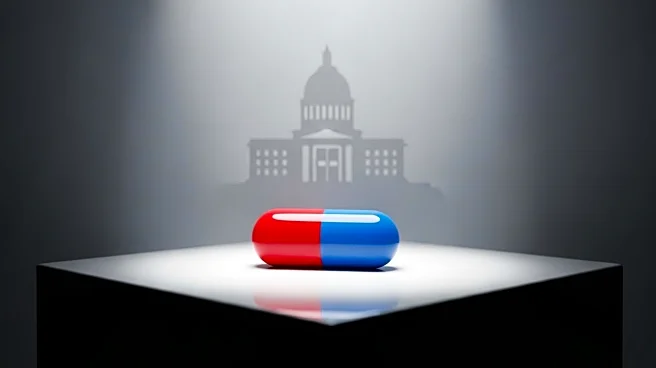What's Happening?
As the possibility of a government shutdown looms, President Trump is facing criticism over his administration's handling of health policy issues, including drug pricing and vaccine policies. The Trump administration has set a deadline for drugmakers to show significant progress in reducing prices under the 'Most Favored Nation' initiative. This policy aims to cap U.S. drug prices at the lowest level paid by peer countries. Additionally, President Trump has sparked controversy by promoting fringe vaccine ideas at a news conference on autism, which has unsettled some GOP congressional offices. The administration's stance on vaccines has raised concerns among health professionals and industry groups.
Why It's Important?
The ongoing debates over drug pricing and vaccine policies have significant implications for the U.S. healthcare system and public health. The 'Most Favored Nation' initiative could lead to lower drug prices, benefiting consumers but potentially impacting pharmaceutical companies' profits. President Trump's vaccine comments could influence public perception and vaccination rates, posing risks to public health. The government shutdown threat adds urgency to these issues, as extended subsidies for health insurance are at stake, affecting millions of Americans. The healthcare industry, including insurers and patient groups, is actively lobbying for policy extensions to prevent insurance price spikes.
What's Next?
Drugmakers have until next week to demonstrate progress in reducing prices, with potential regulatory consequences if they fail to meet the administration's goals. The Advisory Committee on Immunization Practices is scheduled to meet next month to discuss vaccine recommendations, which could impact insurance coverage for vaccines. The government funding bill, including health insurance subsidies, remains a contentious issue, with negotiations ongoing between Democrats and Republicans. President Trump's influence on these debates could shape the outcome of these critical health policy decisions.
Beyond the Headlines
President Trump's promotion of fringe vaccine ideas highlights the ethical and public health challenges of misinformation. Linking vaccines to autism, despite scientific evidence to the contrary, risks undermining public trust in vaccination programs. The administration's approach to drug pricing and healthcare subsidies reflects broader political and economic dynamics, with potential long-term impacts on healthcare access and affordability. The intersection of health policy and political strategy underscores the complexity of navigating these issues in a polarized environment.









